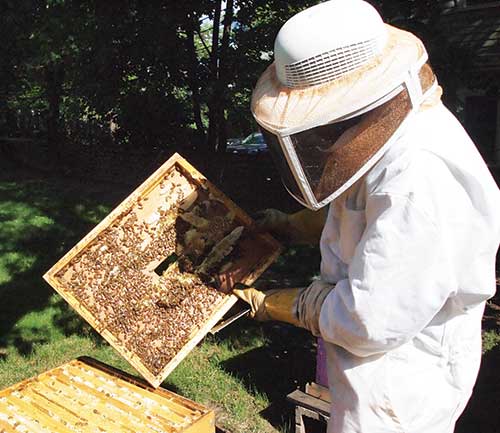
“You don’t see a lot of black people beekeeping, at least not in Boston,” says Leonard Lee, one of only two people he’s aware of who are minding hives in Roxbury, Dorchester or Mattapan. The urban beekeeping ranks won’t stay so low if he has anything to do about it. Since catching the bug seven years ago, Lee’s been spreading the word, and he’s on a mission to get 10,000 people to own one hive each.
Lee pauses to lift the top off a boxy wooden hive in a yard behind Dorchester District Court. His uses Langstroth hives, a design invented by a Massachusetts pastor and that involves a series of horizontally stacked square frames, made of wood and wax. With the top of the hive removed, bees are revealed crawling along the exposed structure. The insects are supposed to store honey along the frame itself. But here, inch-tall comb stretches up to fill the space between one frame and the next — a sign that the bees need more space. He’ll have to add another layer to the hive soon. As Lee scrapes away the comb, he talks.
There are a lot of benefits to local honey — beyond the delicious flavor. For example, because the honey is made from local flowers, it can help those who eat it acclimate to the pollen and lessen allergy symptoms. And siting a hive at a community garden or farm has a marked improvement on plant growth, Lee says. He keeps six hives — two behind Dorchester Court, two at his home and two at a community garden in Fort Hill. He’s also been asked to put a hive at a garden that is being built.
The honey hobby
Lee packages his honey under the label “Ruth’s Soulful Bees,” named for his late mother. He gives most of his honey away for free — beekeeping is a passion project and an environmental cause, not a business, he says.
“Bees are critical for the food source,” Lee underscores.
After watching a documentary on the global decline of the bee population and their vital role as crop pollinators, Lee looked to get involved. He reached out to out Noah Rich of Best Bees, a Boston company, and soon had a hive established.
“He came over and thought he’d help for 10 minutes. He stayed for two hours,” Lee recalled. “Next thing I knew, I had two beehives behind my house. I was hooked.”
One challenge to making it a business is that honey production is hard to predict. Lee can only collect surplus honey, after ensuring his bees have enough to feed on during the winter. Last year, Lee harvested 350 pounds of the sweetener from his six hives. Other years, he takes almost none. One of the great lessons he has learned over the years is to be patient and sensitive about honey collection, he says.
It takes about $200 to get into beekeeping, after which hives mostly run themselves. To get involved, you’ll need a protective suit, a hive with at least three frames, equipment such as a smoker for calming the bees and your starter bee population. One option is to buy a package including a queen bee and 3,000 to 4,000 other bees for installation into an assembled hive. Over the next three to four weeks, enough bees will hatch to fill the hive, Lee says, and a hive can hold more than 70,000 insects.
Day to day, Lee’s happy to let nature run its course. Bees roam up to six miles to collect pollen, and if they fill their hive, some will leave to found a new colony. He checks his hives about every three weeks, to ensure water is available nearby, and looks for problems such as mites or sluggish bees. The latter could indicate the creatures have run into pesticides and are sick. In the winter he might dig out the snow to allow bees to leave for a cleansing flight. One tricky part of Boston beekeeping is that fluctuating winter temperatures can trick bees into thinking it’s spring and leaving their hives too early, when the cold still poses a danger.
When in doubt, there are local beekeeping groups to offer advice, such as the Boston Beekeeping Club and the Norfolk Beekeeping Club.
Building buzz
Lee’s quest to raise awareness of urban beekeeping takes a couple of forms. He plans to enter his honey into a large farmer’s festival competition this year, and recently participated in a “Tour de Hives,” during which cyclist participants visited hives in Jamaica Plain and Mattapan.
He also hopes to spread the hive enthusiasm to other groups, with plans to launch a local youth beekeepers club and conversations about creating a program for ex-offenders in Roslindale’s Boston Pre-Release Center. Lee envisions it could be a way for former offenders to learn about nature while getting a chance to give back, get involved and get a chance to build something.
In his day job, Lee is the director of the state’s Division of Violence and Injury Prevention. Often at Department of Public Health meetings, he’ll bring a jar of honey.
“It’s a great ice-breaker, I find,” Lee says.


![Banner [Virtual] Art Gallery](https://baystatebanner.com/wp-content/uploads/2024/04/Cagen-Luse_Men-at-store-e1713991226112-150x150.jpg)



